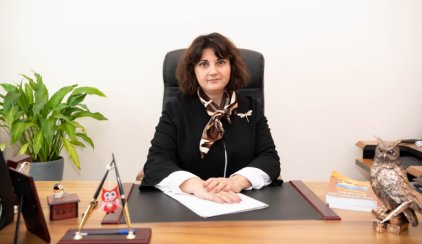Contact center of the Ukrainian Judiciary 044 207-35-46

Judge of the Criminal Cassation Court within the Supreme Court Oleksandra Yanovska conducted a training for prosecutors on the application of the case law of the European Court of Human Rights in the aspects of Art. 3 "Prohibition of torture" and Art. 5 "Right to liberty and security of person" of the Convention for the Protection of Human Rights and Fundamental Freedoms, which was held on January 28, 2022.
As noted by the speaker, the violations of Art. 3 of the Convention by Ukraine today are much less than they were 10-20 years ago when the ECtHR considered cases against Ukraine in which pre-trial investigation and trial were still under the 1960 Criminal Procedural Code of Ukraine (the CPC).
“In 2012, the CPC of Ukraine introduced many tools aimed at preventing any form of torture. Thus, according to Art. 87 of this Code, evidence obtained through significant violation of human rights and fundamental freedoms is inadmissible. The court is obliged to recognize significant violations of human rights and fundamental freedoms, in particular, obtaining evidence as a result of torture, cruel, inhuman or degrading treatment or threat of such treatment," said Oleksandra Yanovska.
The speaker reiterated that Art. 3 of the Convention provided that "no one shall be subjected to torture or to inhuman or degrading treatment or punishment". The article is quite concise, and its interpretation is based on the case law of the European Court of Human Rights. Moreover, Art. 3 is absolute. This means that the state cannot under any circumstances derogate from Art. 3 of the Convention.
As noted by the judge of the Criminal Cassation Court within the Supreme Court, the burden of proof of torture generally rests with the complainant, that is, the person bringing the case before the ECtHR must prove the circumstances complained of (ECtHR judgments in cases of Tomasi v. France, Indelicato v. Italy, Drozd v. Ukraine, Vergelsky v. Ukraine).
But when a person was in custody or under the control of representatives of the authorities, the burden of proof shifts to the state: it is up to the state to prove either that the circumstances stated in the application did not exist or that all possible measures were taken to investigate these circumstances (ECtHR judgments in cases of Berktay v. Turkey, Rehbock v. Slovenia, Afanasyev v. Ukraine, Lotarev v. Ukraine, and other).
With regard to the substantive and procedural aspects of Art. 3 of the Convention, in other words, the negative and positive obligations, the speaker noted the following. The negative obligation is for the state to refrain from torturing a person. The positive obligation is that if, from the point of view of the complainant, he was subjected to torture or inhuman treatment, then the state must conduct an effective investigation. An effective investigation has the following features: institutional independence of the body conducting the investigation; efficiency; active involvement of the victim (conducting appropriate investigative actions); openness (the public should have access to information on the progress and results of the investigation, but with respect to the secrecy of the pre-trial investigation).
Oleksandra Yanovska described typical violations of Art. 5 of the Convention and stressed that the grounds for deprivation of liberty (detention and 24-hour house arrest) are the legality (legal certainty) and reasonableness of suspicion.
In particular, the mere fact that a person is accused of committing a grave crime cannot be a reason for his prolonged detention (ECtHR judgments in cases of Kalashnikov v. Russia, Mikhaniv v. Ukraine). In the Muller v. France judgment, the ECtHR stated that in resolving the issue of the danger of committing new crimes, a reference to a person's past could not be sufficient to justify a refusal to release him from custody.
The judge of the Criminal Cassation Court within the Supreme Court also answered the questions of the training participants, and they performed the practical tasks proposed by the speaker.